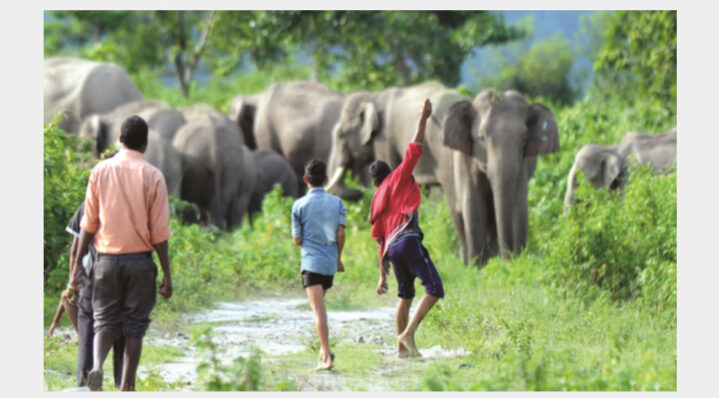
Man versus Elephant
MECHI RIVER, India-Nepal border — Most frontier barriers are erected to prevent humans from breaching national boundaries, but along India’s northeastern border with Nepal an electrified fence has been built to stop a different kind of intruder — hungry elephants. The consequences have proved disastrous for thousands of Indian villagers.
The anti-elephant blockade is probably unique, but the conflict it illustrates is being waged daily across India and a dozen other Asian countries as humans continue to destroy forests and grasslands where elephants thrived for centuries, driving the intelligent mammals to raid crops, demolish dwellings and kill people.
Casualties on both sides of Asia’s elephant wars are heavy. In India, which harbors the continent’s largest elephant population, one animal is killed every four days — by bullets, poison-tipped arrows, high-tension wires, speeding trucks and trains, or homemade liquor laced with insecticides. In the past three years, the government says, one person each day has died in an elephant attack. Shark attacks receive far more international publicity, but killed only four people worldwide in 2016.
For decades, elephant herds crossed the border-demarcating Mechi River during their seasonal migrations, moving from the Indian state of West Bengal to Nepal, where they took a mounting toll on crops — and villagers fought back with gunfire. To halt the depredations, the Nepalese government erected a 17.5km World Bank-funded fence in 2016, about 1km from the frontier. The fence forces elephants who cross the river to return to India, where they raid rice and maize fields and take anything edible that they can find in nearby villages.
Antara Chakraborty, a wildlife biologist with the World Wide Fund for Nature (WWF), said Indian villagers have tried an array of defenses against the intruders, from torches and firecrackers to banging pots and pans, smearing fences with chilies, and planting prickly lemon and pepper trees. The latest “weapon” being tried is burning dried elephant dung, the smell of which the animals are thought to dislike. But Chakraborty said the savvy elephants rarely fall for the same trick twice, so new repellents must constantly be devised.

“We are doing all this to prevent the elephants from harming humans, but where will they get their food?” said Saswati Sen, head of WWF’s West Bengal office, which has been trying to mitigate the conflict in the border area since 2012. Sen questions whether it is ethical to erect barriers across elephant corridors: ”First you take away their land, and now you give them no place to go to,” she added.
In Changa, one of nine villages where Chakraborty works, elephants have raided virtually every household. Some fields lie fallow because farmers have stopped planting or have switched to crops such as turmeric and bay leaves, which elephants shun. Schools are forced to shut when the giants amble down village streets lest children are hurt.
“The elephants come so often that we can no longer expect anything from our fields. What is left after the elephants eat is regarded as a bonus. So we must find other sources of income,” said Bishnu K. Tamang, a farmer in Changa. Elephants have even knocked down the concrete posts of his shed to get at crops he dries and stores high above the ground.

Tamang is a member of one of two anti-depredation squads supported by the WWF which act as rapid reaction forces: When raiding elephants are spotted, one of the squads is alerted and attempts to scare off the animals. Lately, blazing chains wrapped in kerosene-soaked cloth have been found to be quite effective. Squad members swing the chains above their heads, and the flames and swishing noises keep the elephants at bay. Also effective has been a simple early warning system — a trip wire rigged to a sound alarm which can be purchased for less than $5.
Source: https://asia.nikkei.com



